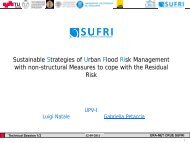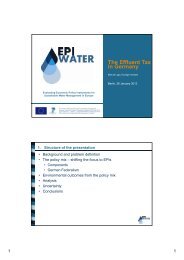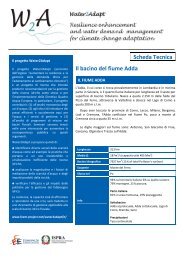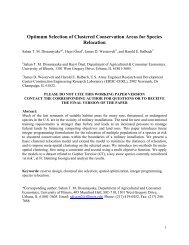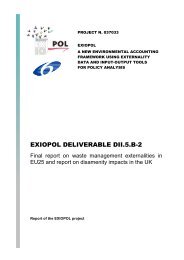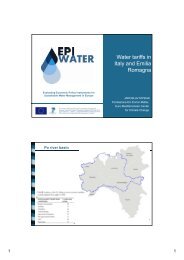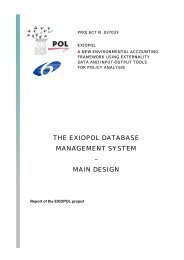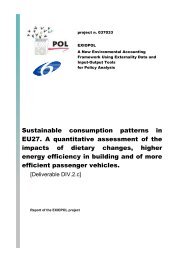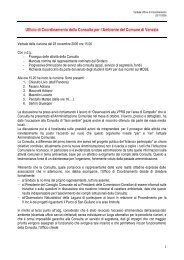Gulf and European Energy Supply Security - Feem-project.net
Gulf and European Energy Supply Security - Feem-project.net
Gulf and European Energy Supply Security - Feem-project.net
Create successful ePaper yourself
Turn your PDF publications into a flip-book with our unique Google optimized e-Paper software.
<strong>Energy</strong> <strong>Security</strong>: Potential for EU-GCC Cooperation<br />
Figure 3: Crude oil exports of Iran, Iraq <strong>and</strong><br />
saudi Arabia, 1970 to 86<br />
Source: OPEC Annual Statistical Bulletin, 1987<br />
uncertain, <strong>and</strong> the intentions of Iran are not clear<br />
– claims over Bahrain keep resurfacing from time to<br />
time, although not in the form of official policy.<br />
The collapse of the Soviet Union has been<br />
another occasion for violent conflict; tensions<br />
have cooled but not disappeared. Notably, the<br />
Caucasus remains an area rife with conflict,<br />
with antagonism/hostility persisting between<br />
Azerbaijan <strong>and</strong> Armenia, Georgia <strong>and</strong> Russia, <strong>and</strong><br />
with secessionist movements in some Russian<br />
republics. At the same time, there has been<br />
some improvement in the troubled relationship<br />
between Turkey <strong>and</strong> Armenia following the visit of<br />
the Turkish President Abdullah Gul to Armenia in<br />
September 2008.<br />
2.2 Historical Experience of Oil <strong>Supply</strong><br />
Interruptions due to Conflict<br />
The lists of major oil supplies disruptions<br />
published by the EIA <strong>and</strong> the IEA concur on six armed<br />
conflict events which caused major disruptions;<br />
these are:<br />
1.<br />
2.<br />
3.<br />
4.<br />
5.<br />
6.<br />
40<br />
The Suez Crisis<br />
The Six-day war<br />
The Yom Kippur war<br />
The Iraq-Iran war<br />
The Iraqi invasion of Kuwait<br />
The US-led Coalition’s intervention in Iraq.<br />
Of these, the first two (Suez crisis <strong>and</strong> the Six-day<br />
war) affected global oil supplies primarily because<br />
the Suez canal was closed – for a short period in the<br />
first case <strong>and</strong> a much longer period in the second.<br />
In the following pages, we discuss the remaining<br />
episodes.<br />
the Iraq-Iran War (First <strong>Gulf</strong> War)<br />
The Iraq-Iran war is especially important for our<br />
analysis because it is the only historical example of<br />
an interstate war between two major <strong>Gulf</strong> producers,<br />
which was bitterly fought over an extended period<br />
of time (eight years) with very high cost in terms of<br />
human life <strong>and</strong> surprisingly limited intervention on<br />
the part of outside powers. It was, in other words,<br />
the “perfect storm” or “nightmare scenario.”<br />
Given the importance of oil as the economic<br />
<strong>and</strong> financial basis for conducting the war, it is<br />
hardly surprising that the two countries repeatedly<br />
attempted to interrupt each other’s oil exports.<br />
The remarkable fact is that both failed: exports<br />
continued at levels that, in the light of the decline<br />
in international dem<strong>and</strong> <strong>and</strong> OPEC’s attempts at<br />
rationing production, may be considered ‘normal’.<br />
All three major OPEC producers experienced<br />
very substantial decline in their production levels<br />
in response to the decline in OPEC’s overall<br />
international oil market share, rather than because<br />
of the war. If we consider the period 1970-78, we<br />
find that Iran exported on average 4.625 million<br />
barrels per day (b/d), Iraq 1.908 million <strong>and</strong> Saudi<br />
Arabia 6.525 million. The impact of the war appears<br />
to have been very significant only in 1980-81, when<br />
both Iranian <strong>and</strong> Iraqi exports were very low, while<br />
Saudi Arabia was pumping at an extraordinarily high<br />
level.<br />
In the first days of the war Iran attacked the<br />
pipelines through which Iraq exported oil to the<br />
Mediterranean across Syria <strong>and</strong> Turkey. But by the<br />
end of November 1980, Iraq had resumed exports<br />
via Turkey at an estimated level of 400,000 b/d. At<br />
the same time, Iraq also attacked Iranian export<br />
installations <strong>and</strong> caused considerable disarray, but<br />
within a month Iran was already exporting again, to<br />
the tune of 3-400,000 b/d.<br />
Overall, the experience of the war suggests that<br />
overl<strong>and</strong> oil transportation via pipelines is more<br />
resilient to attacks than maritime outlets <strong>and</strong> sea



